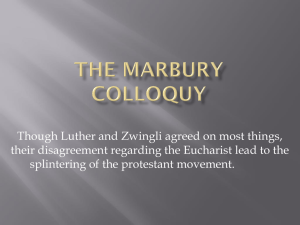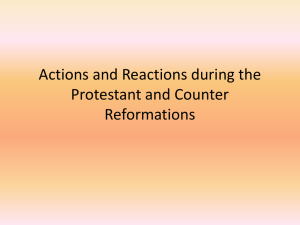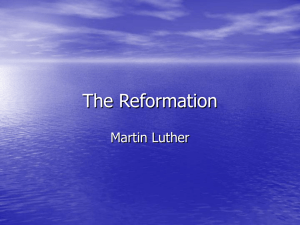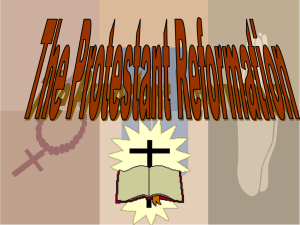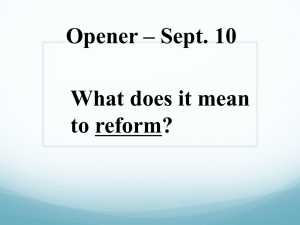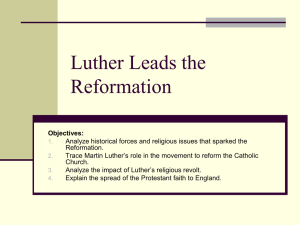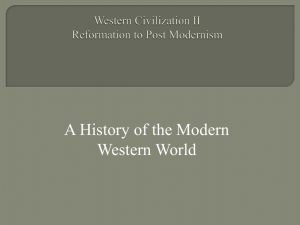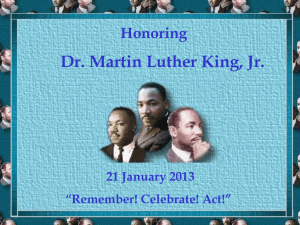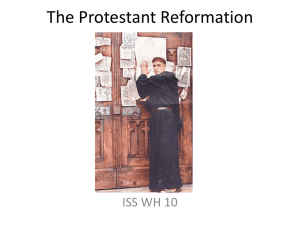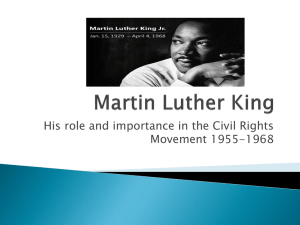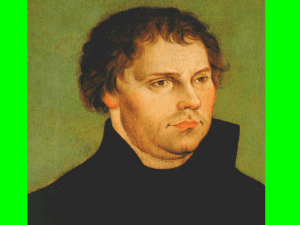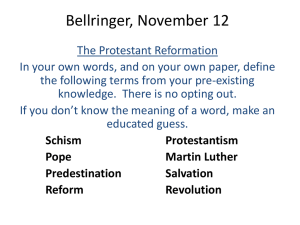Reformation & Religious Wars 1500-1600
advertisement
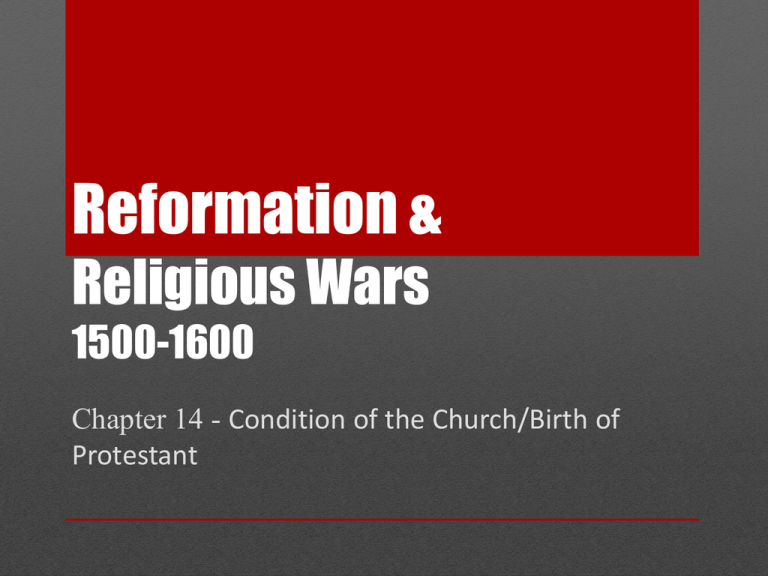
Reformation & Religious Wars 1500-1600 Chapter 14 - Condition of the Church/Birth of Protestant Almost every AP exam includes an essay question on the Reformation or the Counter-Reformation. While sometimes those questions deal primarily with religious issues, more often they deal with social, economic or political factor. AP Tip • Martin Luther • Wyclif’s ideas from 2 centuries earlier • Publically challenged practices & theories of the Catholic Church • 95 Theses – 1517 • Protected by several German princes • Escaped persecution • Launched a new church • Based on sola Scriptura – only by Scripture • Justification by faith alone • Priesthood of all believers • Luther’s reformed church • Stimualted other reformers • John Calvin • Predestination • Support • • • • 1st in Geneva England Holland Henry VIII – estab. The Church of England • Independent from Rome • Mostly for political reason Key Concepts • Luther’s reformed church • Stimulated other reformers • John Calvin • Predestination • Support • 1st in Geneva • England • Holland • Henry VIII – estab. The Church of England • Independent from Rome • Mostly for political reason Key Concepts • The Catholic Church • Removed some of the abuses that cost it support • At the same time it went on the offensive – theologically • Confirmation of the key elements of the Catholic faith • Seven sacraments • New religious order to combat Protestantism • Jesuit order – most successful in Eur. & abroad • Religious Tension throughout Eur. • Civil war • France – Catholicism wins • Protestants tolerated – Edict of Nants – 1598 • Spain - Religious issues were a major factor in the revolt of the Dutch provinces against Phillip II Key Concepts • Legacy of The Babylonian Captivity & the Great Schism • Christian humanists called for reform and the end of corrupt practices • Simony – buying/selling of church offices • Absenteeism – holding office but living somewhere else • Pluralism – holding more than one office • Anticlericalism – opposition to clergy was widespread • For ignorance, immorality, privileges • Concubines • Drunkeness • Gambling • Only minimally literate The Christian Church th early 16 C • Martin Luther • Monk • Studies led him to challenge the Catholic notion of the importance of good works necessary for salvation • Attending church • Taking communions • Salvation comes from faith, from faith comes good works & charitable acts. • God’s word is revealed only thru the Scriptures The Christian Church th early 16 C • Indulgences • Dominican monk Johann Tezel sold indulgence to pay for St Peter’s • Authorized by Pope Leo • the archbishop who was in debt could keep a portion of the proceeds • Forgiveness for sins • Longstanding tradition • Granted to crusaders • Sold to the public • Tetzel was an accomplished salesman • 95 Theses on the Power of Indulgences • Door of the court church at Wittenburg 10/31/1517 • Challenged the whole concept of indulgences • Spread quickly • 2 years later • Luther denied the legitimacy of papal authority/church councils • Threatened with excommunication • Diet of Worms (assembly of the estates of the empire) • To force Luther into obedience • Luther refused to withdraw his views – bound to Scriptures The Christian Church early 16thC • Modern Catholicism is quite different from the Catholicism that was practiced in Luther’s time, and many Christian students do not know the theological details of the churches to which their families belong. Be sure you understand what the theological disputes where all about. While the details varied, the basic disagreement was over the relationship of man and God and th3e role the organized church plays in man’s salvation. AP Tip • Luther’s follower called Protestants • Ulrich Zwingli • • Swiss Erasmian humanist Protestant thinker • Sola Scriptura • Attacked indulgences, monasticism, clerical celibacy & the Mass • Luther & Zwingli • argued that faith determined salvation • Not faith and good works • • Individuals interpret the Bible Only 2 sacraments are legitimate • Baptism • Holy Communion – Eucharist • The church is a community all Christians • Not a hierarchical institution with the Pope as its head • All are equal in status • Luther & Zwingli disagreed about the Eucharist • Catholics believed in the doctrine of transubstantiation • • • • Transformation of wine/wafer to blood/body of Christ Luther believed that Christ’s presence is Real, it is not physical Zwingli argued that the Eucharist was only a memorial Eucharist was a divisive issue among Protestants. Protestant Thought • The doctrine of transubstantiation asserts that a miracle occurs each time the Mass is performed. It is so that they can perform this miracle that priests must be pure in thought and deed, and therefore cannot marry or live ordinary lives. When the Protestants renounced this doctrine, they removed the distinctive function of Catholic priests. All Protestant clergy can marry and have children, and except in the Anglican version, are called ministers, not priests. AP Tip • Artists served both Catholics and Protestants • Lucas Cranach the Elder – close friend of Luther • Painted a number of Old Testament scenes • Protestants embraced the Hebrew Bible & the New Testament • Vasari • Painted the St Bartholomew’s Day Massacre for the pope • Catholics & Protestants disagreed about the function of art • Catholics felt the likenesses of Christ, saints & Mary promoted piety & veneration • Developed the Baroque form of art • Dramatic & emotional intense • Protestants – 2nd commandment forbade graven images • Zwingli believed art & music were unnecessary & interfered with faith • Luther felt art spread the message of faith • He composed a number of hymns • John Calvin – Protestant theologian • Start simplicity in churches – empty of decoration,, forbid dance and theatre Art of the Reformantion • Spread of Luther’s ideas • Printed broadsides • vicious caricatures of the pope & indulgences • • • • Theological texts Luther’s translation of the Bible into German Preaching Two catechisms • Helped people learn and remember Protestant doctrine • Appeal to many • Humanists & educated people • Had been calling for reform • Priests & monks • Nuns • Women • Improved status • Marriage the true Christian life • Urban dwellers & peasants • Status raised – doctrine of priesthood of all believers • City governments • Protestant leader worked closely with gov • Able to tax Protestant clergy Appeal of Protestant Ideas • Lutherans created a national church • Ruler held authority over the church except in matters of faith • Radicals wanted greater breaks with the past • • • • Estab. Voluntary communities of believers Antibaptists rejected infant baptism Others argued for literal interpretation of the Bible Quakers in 17thC Britain • Pacifists – refused to swear oaths • Some argued for communal ownership of property • Congregationalists insisted on democratic organization • Radicals were persecuted by Protestants & Catholics • Shared an opposition to the separation of church and state • They saw as a secularizing society Radical Reformation • All revolutions, it seems, prompt small extremist groups. Most of the Protestant radicals were persecuted or even killed, but some group like the Quakers in England and the Mennonites of the Amis in Czech Moravia found a haven in the American colonies, particularly New England and Pennsylvania AP Tip
